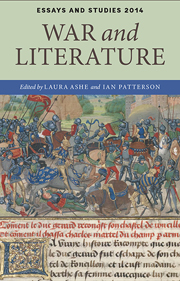Book contents
- Frontmatter
- Contents
- List of Illustrations
- Notes on Contributors
- Preface
- I IDEOLOGIES
- II INTERPRETATIONS
- III AFTERMATHS
- A Feeling for Numbers: Representing the Scale of the War Dead
- The Guilt of the Noncombatant and W. H. Auden's ‘Journal of an Airman’
- Does Tolstoy's War and Peace Make Modern War Literature Redundant?
- Index
The Guilt of the Noncombatant and W. H. Auden's ‘Journal of an Airman’
from III - AFTERMATHS
Published online by Cambridge University Press: 05 October 2014
- Frontmatter
- Contents
- List of Illustrations
- Notes on Contributors
- Preface
- I IDEOLOGIES
- II INTERPRETATIONS
- III AFTERMATHS
- A Feeling for Numbers: Representing the Scale of the War Dead
- The Guilt of the Noncombatant and W. H. Auden's ‘Journal of an Airman’
- Does Tolstoy's War and Peace Make Modern War Literature Redundant?
- Index
Summary
W. H. Auden wrote that the Great War was ‘the decisive experience’ of Wilfred Owen's life. In the absence of such experience, Auden and his generation struggled to find grounds from which to write during the 1930s. In the present essay, I show that Auden's ‘Journal of an Airman’, which is Book II of The Orators (1932), reflects the legacy of the Great War for interwar English writers and ‘the guilt that every noncombatant feels’, as he calls it. This guilt is a manifestation of a larger cultural turn that military historians have traced back to the Enlightenment, in which non-transmittable knowledge is understood to be gained exclusively through sensory experience on the battlefield. That knowledge grants combat veterans the ‘authority of flesh-witnessing’. After discussing this cultural turn and how it affected Auden and his generation, I explore how positions of optical dominance inform the ‘Journal of an Airman’ and the text's concern with the idea of the poet as wartime orator – elements that presage Auden's World War II poetics. I conclude by considering an often-overlooked episode in Auden's life, when he was sent to assess the effects of air bombing on German morale as part of the 1945 US Strategic Bombing Survey.
- Type
- Chapter
- Information
- War and Literature , pp. 205 - 227Publisher: Boydell & BrewerPrint publication year: 2014

